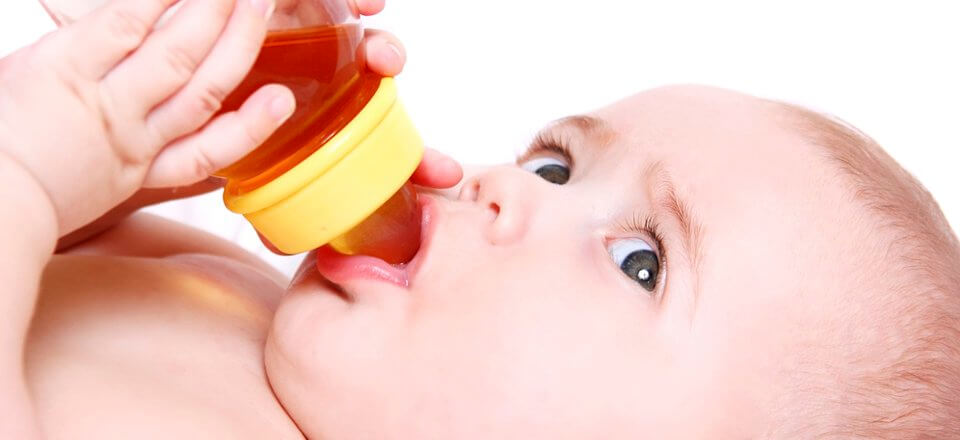How to Prevent It
Proper dental care is a lifelong commitment that starts even before your baby’s first tooth forms. While daily cleanings and fluoride are important, they alone may not prevent Baby Bottle Tooth Decay (BBTD), a major cause of tooth decay in infants. Baby Bottle Tooth Decay is costly to treat. If left untreated, however, it can quickly destroy the teeth involved. It also can lead to pain, infection, early loss of baby teeth, crooked permanent teeth, and an increased risk of decay in permanent teeth. When you consider the possible dental problems that can result from BBTD and the cost of treating those problems, it is best to prevent BBTD from developing in the first place.
How Does Baby Bottle Tooth Decay Develop?
Baby Bottle Tooth Decay can develop if your child’s teeth and gums are in prolonged contact with almost any liquid other than water. This can happen from putting your child to bed with a bottle of formula, milk, juice, soft drinks, sugar water, sugared drinks, etc. Allowing your baby to suck on a bottle or breastfeed for longer than a mealtime, either when awake or asleep, also can cause BBTD.
When liquid from a baby bottle builds up in the mouth, the natural or added sugars found in the liquid are changed to acid by germs in the mouth. This acid then starts to dissolve the teeth (mainly the upper front teeth), causing them to decay. Baby Bottle Tooth Decay can lead to severe damage to your child’s baby teeth and also can cause dental problems that affect your child’s permanent teeth.
Why Are Baby Teeth Important?
Many parents assume that decay does not matter in baby teeth because the teeth will fall out anyway, but decay in baby teeth poses risks. If your child loses his baby teeth too early because of decay or infection, the permanent teeth will not be ready to replace them yet. Baby teeth act as a guide for the permanent teeth. If baby teeth are lost too early, the teeth that are left may shift position to fill in the gaps. This may not leave any room for the permanent teeth to come in.
What Can I Do to Prevent Baby Bottle Tooth Decay?
Take the following steps to prevent Baby Bottle Tooth Decay:
- Never put your child to bed with a bottle. By 7 or 8 months of age, most children no longer need feedings during the night. Children who drink bottles while lying down also may be more prone to getting ear infections.
- Only give your baby a bottle during meals. Do not use the bottle as a pacifier; do not allow your child to walk around with it or to drink it for extended periods. These practices not only may lead to BBTD, but children can suffer tooth injuries if they fall while sucking on a bottle.
- Teach your child to drink from a cup as soon as possible, usually by 1 year of age. Drinking from a cup does not cause the liquid to collect around the teeth, and a cup cannot be taken to bed. If you are concerned that a cup may be messier than a bottle, especially when you are away from home, use one that has a snap-on lid with a straw or a special valve to prevent spilling.
- If your child must have a bottle for long periods, fill it only with water.
Keeping your baby’s mouth clean is also important in preventing tooth decay. After feedings, gently brush your baby’s gums and any baby teeth with a soft infant toothbrush.
Start using water and a soft child-sized toothbrush for daily cleanings once your child has seven to eight teeth. By the time your toddler is 2 years of age, you should be brushing her teeth once or twice a day, prefer-ably after breakfast and before bedtime.
Begin using a fluoride toothpaste when you are sure the toothpaste will not be swallowed (usually when your child is around 3 years of age). Use a pea-sized amount of toothpaste to limit the amount your child can swallow.
Too much fluoride can be harmful to a child.
Detect Decay Early
Baby Bottle Tooth Decay first shows up as white spots on the upper front teeth.
These spots are hard to see at first—even for a pediatrician or dentist—without proper equipment. A child with tooth decay needs to get treatment early to stop the decay from spreading and to prevent lasting damage to the teeth.
If you are concerned that your child may have BBTD, your pediatrician can refer you to a pediatric dentist who will carefully examine your child’s teeth for signs of decay.
With the right balance of proper home and professional dental care, your child can grow up to have healthy teeth for a lifetime of smiles.

